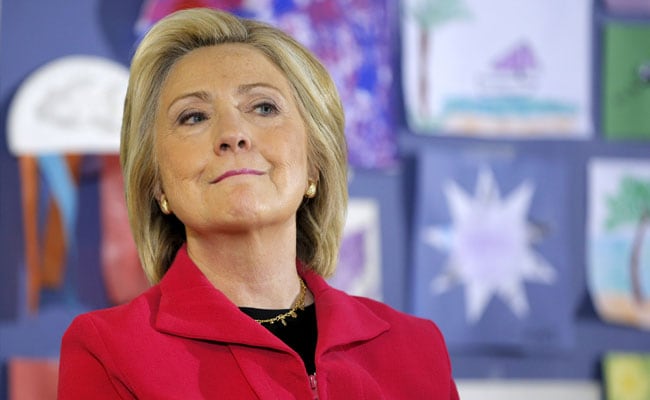
File photo of Hillary Clinton.
Miami:
Democratic presidential candidate Hillary Clinton on Friday urged Congress to end the longstanding U.S. trade embargo against Cuba, calling it a "failed policy" that had done little or nothing to foster change on the communist-ruled island.
Clinton, the former secretary of state to President Barack Obama, used a speech in Miami to draw a contrast with two candidates for the Republican nomination for president in the November 2016 election: former Florida Governor Jeb Bush and Senator Marco Rubio of Florida.
Bush and Rubio have been critical of Obama's move to restore relations with Cuba because of its record on human rights. But Clinton argued diplomacy and engagement would do more to improve conditions in the country.
"The Cuban embargo needs to go once and for all," Clinton, said in Friday's speech, in a region that is home to about 80 percent of America's 1.5-million-strong Cuban-American population.
Obama this year formally restored diplomatic ties with the Caribbean island, about 90 miles from Florida, after more than 50 years of hostility and mutual distrust.
But only Congress can lift the embargo, fully in place since 1962, and Republican congressional leaders are unlikely to do so.
"We can't wait any longer for a failed policy to bear fruit," Clinton said to applause. "We have to now support change on an island where it's desperately needed."
Clinton's speech is a sign of a generational shift in politics in Florida, a large and pivotal state in presidential elections, where younger Cuban Americans are less wedded to the embargo embraced by older exiles.
"This is a different Miami than it was 10 years ago. I'm not sure she could have come here and given this speech then," said Frank Mora, director of Florida International University's Latin American and Caribbean Center, in an interview.
But many remain sceptical. An editorial in the Miami Herald newspaper on Thursday said Cuba needs to give its citizens more basic freedoms before the United States lifts the embargo.
"One does not have to be a hardliner to expect a quid pro quo of some kind as this process moves forward. Simply put, Cuba hasn't earned the embargo's end. Far from it," the newspaper said.
Bush called Clinton's speech "insulting" and called her position "a retreat in the struggle for democracy in Cuba."
Rubio, whose parents came to the United States from Cuba in the 1950s, was equally dismissive.
"Unilateral concessions to the Castros will only strengthen a brutal, anti-American regime 90 miles from our shore," Rubio said in a statement.
Obama has already loosened many restrictions on U.S. travel to Cuba. But Clinton said she would do more to free up travel if elected president, whether or not the embargo has been dismantled.
The embargo allows U.S. sales of agricultural goods and medicine to Cuba, but a market of more than 11 million people is still largely off limits to most U.S. companies because they are banned from doing business in Cuba.
Clinton, the former secretary of state to President Barack Obama, used a speech in Miami to draw a contrast with two candidates for the Republican nomination for president in the November 2016 election: former Florida Governor Jeb Bush and Senator Marco Rubio of Florida.
Bush and Rubio have been critical of Obama's move to restore relations with Cuba because of its record on human rights. But Clinton argued diplomacy and engagement would do more to improve conditions in the country.
"The Cuban embargo needs to go once and for all," Clinton, said in Friday's speech, in a region that is home to about 80 percent of America's 1.5-million-strong Cuban-American population.
Obama this year formally restored diplomatic ties with the Caribbean island, about 90 miles from Florida, after more than 50 years of hostility and mutual distrust.
But only Congress can lift the embargo, fully in place since 1962, and Republican congressional leaders are unlikely to do so.
"We can't wait any longer for a failed policy to bear fruit," Clinton said to applause. "We have to now support change on an island where it's desperately needed."
Clinton's speech is a sign of a generational shift in politics in Florida, a large and pivotal state in presidential elections, where younger Cuban Americans are less wedded to the embargo embraced by older exiles.
"This is a different Miami than it was 10 years ago. I'm not sure she could have come here and given this speech then," said Frank Mora, director of Florida International University's Latin American and Caribbean Center, in an interview.
But many remain sceptical. An editorial in the Miami Herald newspaper on Thursday said Cuba needs to give its citizens more basic freedoms before the United States lifts the embargo.
"One does not have to be a hardliner to expect a quid pro quo of some kind as this process moves forward. Simply put, Cuba hasn't earned the embargo's end. Far from it," the newspaper said.
Bush called Clinton's speech "insulting" and called her position "a retreat in the struggle for democracy in Cuba."
Rubio, whose parents came to the United States from Cuba in the 1950s, was equally dismissive.
"Unilateral concessions to the Castros will only strengthen a brutal, anti-American regime 90 miles from our shore," Rubio said in a statement.
Obama has already loosened many restrictions on U.S. travel to Cuba. But Clinton said she would do more to free up travel if elected president, whether or not the embargo has been dismantled.
The embargo allows U.S. sales of agricultural goods and medicine to Cuba, but a market of more than 11 million people is still largely off limits to most U.S. companies because they are banned from doing business in Cuba.
© Thomson Reuters 2015
Track Latest News Live on NDTV.com and get news updates from India and around the world

